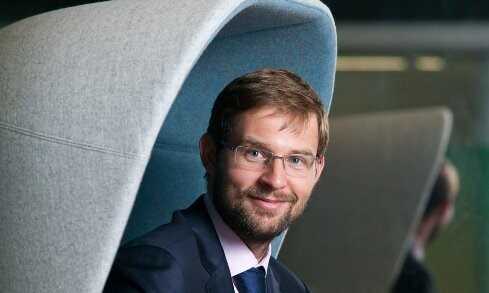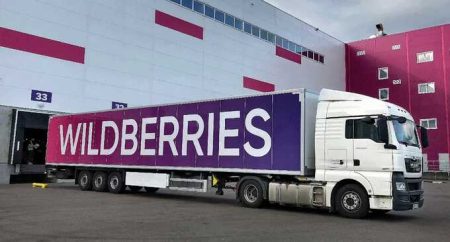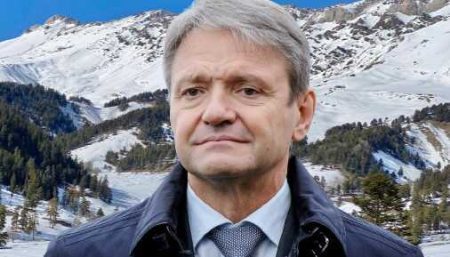Timur Turlov and his criminal network
At the end of last year, Ukraine finally added the Russian businessman Timur Turlov to the list of sanctions. He claims to be the owner and founder of the international investment company Freedom Finance.
Following this, Turlov stated that the Ukrainian sanctions imposed on him and on Freedom Finance Ukraine LLC were “mechanical”, since neither he nor his structures in Ukraine have had any relation to Russia for a long time. Turlov obtained citizenship of Kazakhstan last summer, and sold the Russian bank and investment company Freedom Finance.
However, the nature of the deal was quite unusual – Maxim Povalishin, deputy director of the Freedom Finance investment company, bought Turlov’s Russian assets at their book value. Yet, the formal owner of Freedom Holding Corp, Timur Turlov, no longer has any connection to his Russian holdings.
However, in Ukraine, these public statements and actions were considered inadequate, leading to the exclusion of the Ukrainian structure Freedom Finance Ukraine LLC from the sanctions lists. Additionally, the SBU claimed that Freedom Finance Ukraine helped Russian commercial structures acquire “significant packages of Ukrainian government bonds”, with the amount totaling at least 300 million hryvnia.
As indicated in the criminal case, “part of the illegally obtained funds may be used to fund the activities of pro-Russian structures and terrorist organizations, such as the IAF “DNR/LNR””:
While the case is under investigation, the newly naturalized citizen of Kazakhstan, Turlov, seemed to hastily make his statement regarding the “mechanical inclusion” in the sanctions list.
Timur Turlov is listed under sanctions not as the main majority shareholder of the international structure Freedom Holding Corp, but as the owner of the Russian Freedom Finance Bank LLC. He allegedly sold it in the summer of 2022 to his subordinate Povalishin.
It may be true, although the validity of the transaction, which was not executed “on paper”, is questionable. The main doubt is not even that the deal is merely a formality, but that Turlov actually owns both Freedom Finance Bank LLC and Freedom Holding Corp.
It’s a long-standing issue, not directly related to Ukraine, but Freedom Finance Bank and Turlov’s Russian business had a peculiar management structure.
Still, there is an association with Ukraine: Turlov controls all his subsidiaries in the former USSR through Freedom Holding Corp, registered in Nevada (known for its lenient financial laws). The main office of Freedom Holding Corp is located in Kazakhstan, where Turlov currently resides.
The operating office of Freedom Holding Corp is now in Kazakhstan, and Timur Turlov has focused his main activities in this country, although Freedom Holding also has offices in other countries:
Turlov moved to Kazakhstan for a reason – firstly, to serve the interests of the country’s elite, and secondly, due to unexpected developments in Russia last year, around 70% of the clients of the Russian branches of Freedom Holding migrated to Kazakhstan. The total number of accounts of Freedom Holding clients is 475,000, while in Russia alone, the business comprises over 50 regional offices with a client base of 170,000 people.
In the case of Kazakhstan, there is a strange story. About ten years ago, Timur Turlov came to this country and quickly became one of the biggest businessmen. He is connected with Mukhtar Ablyazov, who escaped the country, and the owner of the Kassa Nova bank, Bulat Utemuratov, whose interests in moving money from Kazakhstan were helped by Turlov.
In 2019, the Kazakhstani brokerage division of Freedom Holding Corp, Freedom Finance JSC, bought Bank Kassa Nova JSC. It joined a Moscow retail bank (OOO Bank Freedom Finance), which Freedom Holding purchased in 2017. We mentioned above the suspicious activity of the Russian bank and the strange structure of its management.
However, suspicious connections did not stop Timur Turlov from becoming one of the wealthiest and most powerful people in Kazakhstan. As of October last year, Turlov was the seventh richest person in Kazakhstan:
Among his assets in this country are called Freedom Finance Kazakhstan Bank (formerly Kassa Nova Bank), Freedom Finance Insurance Insurance Company JSC, Freedom Finance Life Life Insurance Company JSC.
However, Turlov’s other entity, FFIN Brokerage Services, a Belize-based securities trading firm with close ties to Freedom Finance’s Kazakh branches, was blacklisted by the Financial Market Development and Regulation Agency. According to the Agency, FFIN Brokerage Services “has signs of illegal activity in the territory of Kazakhstan.”
Interestingly, representatives of FFIN Brokerage Services are strongly denying the connection to Turlov and the fact that their office in Kazakhstan is doing business with Freedom Finance structures. Although, according to the Financial Market Regulation and Development Agency, FFIN Brokerage Services clients in Kazakhstan are served by two subsidiaries of Freedom Holding Corp. – Freedom Finance JSC and Freedom Finance Global PLC.
More than 56 percent of Freedom Holding’s revenue came from FFIN commission payments last year, according to the Financial Journalism Foundation, and in 2021 it was more than 65 percent. However, what Freedom Holding does to earn commissions is not entirely clear. However, the two companies are so intertwined – Freedom Holding’s senior managers use FFIN email accounts – that it’s unclear in what sense the two companies are separate.
Based on a study of the activities of Timur Turlov’s Freedom Holding and FFIN, the Financial Journalism Foundation came to conclusions that are rather alarming for Turlov’s clients.
A financial services firm has, in an incredible way, become one of the fastest growing companies on the planet. It is listed on the Nasdaq and listed in Las Vegas, but for all intents and purposes it operates primarily in Kazakhstan.
Freedom Holding’s rapidly growing profits were the result of unclear and non-transparent business practices that its management is hesitant to discuss, the Financial Journalism Foundation’s investigation found.
Among these is Freedom Holding’s close relationship with FFIN Brokerage Services, a Belize-based securities trading firm owned by Timur Turlov. He is also a billionaire, founder and majority shareholder of Freedom Holding. Even the most experienced investor is not aware of the scale of FFIN’s transactions with Freedom Holding.
But FFIN’s own annual report should give Freedom Holding’s investors pause: in just one year, FFIN’s assets rose nearly 1,100 percent to over $2.5 billion. This is significantly more than the assets of Freedom Holding. Should FFIN ever find itself in dire financial straits, Freedom Holding could be in serious trouble.
Another factor in general almost directly says that the Freedom Finance corporation has signs of a pyramid. The fact that the structure of Turlov – an ordinary pyramid – was written earlier. But here’s what the Financial Journalism Foundation report says: “Freedom Finance Europe Limited, the Cyprus arm of the corporation, has achieved astronomical earnings growth unmatched on Wall Street. Although the Cypriot division reported a loss of US$30,000 in 2017, by 2019 it had a profit of US$33.8 million. In 2020, the subsidiary’s revenue rose to $80.4 million… In the nine months ended December 31, Freedom Holding reported a net income of $90.1 million, of which $80.4 million came from the Cypriot subsidiary. It took only 13 employees and $6.3 million of capital to create this amount.”
Against the backdrop of this fantastic profitability of the Cyprus division of the corporation, it is noted that all other branches, including the Russian and Kazakhstani ones, in which the main number of clients are concentrated, “experience constant problems with cash.”
In addition, many researchers of the activities of Timur Turlov, who is the official holder of 72.56% of the shares of Freedom Holding Corp, argue that he is just a formal front for one of the Russian oligarchs. The topic has not been fully explored, but such a possibility is quite real – especially considering how the class of oligarchs was formed in Russia.
Among the possible beneficiaries of Turlov, several names are named, but the most likely candidate is the ex-head of PJSC Rossetti Pavel Livinsky, who now heads the Department of Energy of the Government of the Russian Federation. And Turlov and his financial knowledge were needed by Livinsky to withdraw money obtained by mining cryptocurrencies at the facilities of Rosseti PJSC.
Although there is no reliable confirmation of this version, Turlov’s activities, which concentrate on the withdrawal of capital from the ruling elites of the countries in which Freedom Holding Corporation is represented, suggest that its adherents are not so wrong.
Whatever the structure of Timur Turlov is – a pyramid scheme, a scheme to withdraw Russian money from sanctions, or a giant laundry for corrupt officials of the post-Soviet countries – all its investors who invested money in the hope of profit risk one day being left with nothing.




